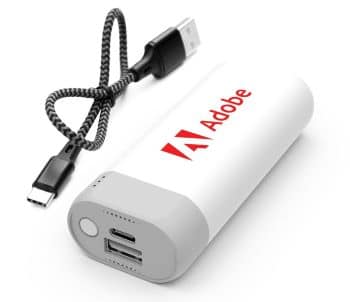Gen Z may have the advantage of youth, but they also are the first generation to grow up with technology at their fingertips. They’ve never known a world without laptops, mobile phones and AirPods. From the time they were toddlers, they could swipe through photos on a phone and watch YouTube kids’ videos on an iPad.
The rest of us grew up using a pen and paper, and the family phone with its landline and curly cord. Learning to operate computers with their continuous iterations of software updates, mobile phones, chargers and all the peripherals that come with technology is easier for some than others.
Even if you are a Millennial or Gen Xer, but especially if you are a Baby Boomer or older, you may struggle to keep up where technology is concerned. So, if you are researching and recommending portable chargers, speakers, and phone accessories to your clients, chances are you are not only hesitant and intimidated. You may feel incompetent, too.
Promotional products clients expect you to be the expert, so here’s your chance to come up to speed quickly on how to sell two of the most popular tech categories, chargers and speakers, no matter your age or level of comfort with technology.
Chargers
A portable charger is used to power up phones and other USB-powered devices like tablets, headphones and laptops. It uses a lithium-ion battery and its capacity is measured in milliamp hours (mAH). The higher the mAH, the more capacity.
If you choose a charger with multiple ports to charge two or three devices at once, be sure it has enough power to handle them. The minimum should be 2,200 mAH; from there, battery capacities typically go to 5,000, then 10,000 and 20,000 mAh.
Also, look for chargers with a Type C port, a new type of port that allows in/out charging: It can take in a charge (to recharge the charger) it can give out a charge (to charge a device) and can handle much higher power (voltage and current).

The charger will need a cable that has a Type C tip on one end and a micro-USB tip on the other. This will allow you to add Apple Lightning and “C” tips to charge a variety of devices as required.
Your client will also want to know about the safety of the charger. Not all chargers are the same. You’ve heard the phrase, “You get what you pay for.” This statement is particularly true with chargers because of their complex circuitry.
You should know the supplier from whom you are buying a charger and check their website for copies of the testing certificates used to ensure the charger has undergone and passed all safety tests. At a minimum, make sure that the battery is UL-approved and that the charger displays initials from Nationally Recognized Testing Laboratories including the Canadian Standards Association (CSA) or Communication Certification Laboratory, Inc. (CCL), among others.
The battery should also carry the UL Mark, one of the most common identification marks, signifying the product meets all of UL’s safety requirements for fire, shock and electrical safety. Other certifications to look for are, of course, Prop 65 and RoHS, which confirm that the proportion of hazardous, or difficult to dispose of substances, is limited to the maximum allowed.
Speakers
Portable speakers let you take great music along wherever you go. The leading ones today use Bluetooth technology to wirelessly play from a phone. Your clients will want the highest quality available in their price range.
Five-watt speakers provide much better sound quality than 3-watt speakers do, as does Bluetooth 5.0 compared to 4.2.

Ideally, look for six hours or more of playtime and speakers with a passive radiator, a component that gives the speaker system the comparable performance characteristics of a much larger system. Also, look for a new feature, True Wireless Stereo technology (TWS), that lets the user pair two of the same speakers within Bluetooth range for true stereo sound.
When helping your client select speakers, follow the same safety protocols as for chargers, including buying from a reputable supplier you trust and checking the supplier’s website to ensure the product has been tested and certified.
Finally, your confidence in the supplier and its products should be reflected in their warranties. If the supplier offers a lifetime warranty with original branding, they are truly confident in the quality and safety of their products, and you can be too.
Filipski is director of corporate relations at PowerStick.com. She is a 26-year promotional products industry veteran and was previously director of publications and editor at PPAI.


